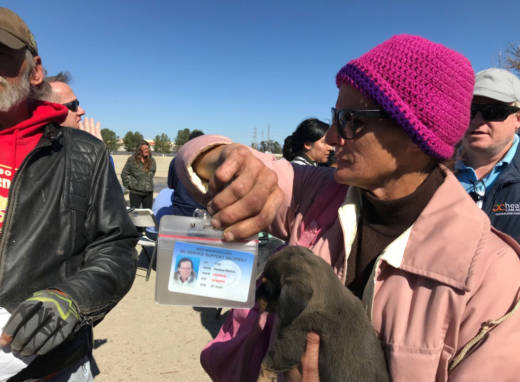County homeless czar Susan Price said the county was on track to locate a sufficient number of motel rooms for residents of the riverbed encampment, including a deal to lease 100 rooms at one motel. County lawyers had filed a court brief over the weekend reporting difficulties finding motels willing to house the homeless.
According to Price, 144 people have been moved into motels since Feb. 14, and a few have already been evicted.
Price acknowledged that some motel owners had backed out of offers to accept riverbed homeless people after hearing reports of bad conduct by some who have accepted motel vouchers. But she vowed to find housing to fulfill the judge’s order.
“Incrementally, we’ll make anything happen and we are doing that each and every day,” Price said.
She said cars had been dropping homeless people off at the riverbed in recent days, complicating the county’s effort to comply with a judge’s order to provide shelter for those who had been camped long term along the riverbed.
However, Carol Sobel, one of the lawyers representing homeless people camped along the riverbed, said some long-term campers had left the riverbed only in recent weeks and should be eligible for housing.
One woman, Brandy Phelps, said she came to the riverbed Monday with her two sons, ages 14 and 16, in hopes of getting a 30-day motel voucher. She said she has been homeless since November and has been bouncing around between motels and shelters.
“I was hoping for a little breather to be able to get something going,” she said. “Be able to plant my stuff and my kids somewhere and not have to worry for a few days, and be able to get hustling and working.”
A county worker told Phelps she would try to find an alternative for her.
Serena Welch, who has lived along the riverbed for more than four years, waited in line Tuesday morning carrying a pink backpack and trying to keep track of her small dog. She carried a county-issued ID card that she got Monday.
Some homeless people have been unable to move into motels because they lacked valid identification.
Welch said she was tired of standing in lines but was hopeful that a motel stay would help her get back on her feet. She said her adult son, who had also been living at the river, had gotten a motel voucher in recent days and was now looking for an apartment for both of them.
“I just need to get myself into a motel until then so I can get myself together,” Welch said. "This had to happen for me to start doing that.”
At the front of the line, a county worker found Welch’s name on the list and directed her to wait for transportation to a motel. Welch said she’d come to collect the rest of her belongings once she was settled in.
Sobel, the lawyer, called the county’s process for offering motel vouchers on Tuesday “a little bit chaotic.”
“It’ll be amazing if they actually get people cleared out today,” she said. Judge David O. Carter, who signed off on the deal to clear the riverbed, has said he wants the area to be cleared by the end of the day, if possible.
Carter lifted a temporary restraining order Tuesday morning that has prevented the county from clearing homeless people out of the area without offering them alternative housing.
Dave Sawyer, a captain with the Orange County Sheriff’s Department, said deputies could start arresting people who refuse to move by the end of the day.
“We know from prior experiences out here that not everyone is going to accept the resources we’re offering,” he said.
Carter gave his tentative approval to the plan last week.
After hours of closed-door negotiations between county officials and lawyers for the homeless, Orange County Supervisor Andrew Do told the judge that the county would commit to offering up to 400 hotel rooms for people currently camped out at the riverbed. He later said the county would pay for them for up to 30 days.
Do also pledged an additional 60 beds that would be placed in temporary structures in the parking lot of a county homeless shelter in Anaheim, 100 beds at a women’s shelter and some 200 beds that could be placed in tents at two county-owned parking lots in Orange and Santa Ana.
Do later said that the new emergency shelters in parking lots would be offered as places for people to go after the 30 days in hotel rooms. He said wraparound services, like case management and mental health support, would also be offered to those who accept the hotel vouchers.
Last week’s hearing was the first court date in a lawsuit filed by advocates for the homeless seeking to halt the county’s plans to clear the sprawling riverbed homeless encampment. Earlier this month, Carter ordered the county to temporarily stop telling homeless people to leave, pending the outcome of the hearing.

